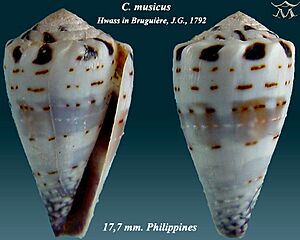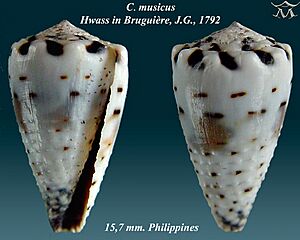Conus musicus facts for kids
Quick facts for kids Conus musicus |
|
|---|---|
 |
|
| Apertural and abapertural views of shell of Conus musicus Hwass in Bruguière, J.G., 1792 | |
 |
|
| Conservation status | |
| Scientific classification | |
| Synonyms | |
|
The music cone (scientific name: Conus musicus) is a type of sea snail. It's a marine gastropod mollusk that belongs to the Conidae family, also known as the cone snails.
These snails are predatory, meaning they hunt other animals for food. They are also venomous, which means they can sting. Because of this, it's very important to be careful around live music cones and avoid touching them.
There is also a special kind of music cone called a subspecies, known as Conus musicus parvatus.
What Does the Music Cone Look Like?
The shell of an adult music cone is usually between 14 and 30 millimeters long. That's about half an inch to just over an inch.
The shell is mostly whitish in color. It has broad bands that are a light ash-violet shade. You can also see narrow lines that look like chocolate, broken up into short lines and spots.
The top part of the shell, called the spire, often has a slightly crown-like shape. This part also has chocolate-colored markings that look like rays.
Where Do Music Cones Live?
You can find the music cone in many warm ocean waters around the world.
They live in the Red Sea and in parts of the Indian Ocean. This includes places like Aldabra, Chagos, Madagascar, Mozambique, and Tanzania.
They are also found in the Central Indian Ocean, near Sri Lanka and the Maldives. Their habitat extends to the Marshall Islands, the Solomon Islands, Fiji, and the Ryukyu Islands.
In Australia, you can find them off the coasts of New South Wales, the Northern Territory, Queensland, and Western Australia.


